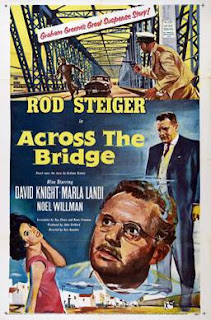R.I.P. to the great Roger Corman.
Here's my utterly trivial Corman story: Back in 2000, I did an edition of my KTAR radio show Another Saturday Night by remote from a station in Palm Springs during the weekend of the Palm Springs Film Festival. There were a few pretty big Hollywood stars there that year, and I had expressed confidence to my bosses at the station that I might be able to get a couple of them to sit down as guests on the show.
I wasn't.
One of the few guests of any stature that I was able to land was Rachel Samuels, who had directed a film in the festival called The Suicide Club with Jonathan Pryce and Paul Bettany, based on the Robert Louis Stevenson story, for the Irish division of Corman's Concorde Pictures (it was later lamely retitled The Game of Death). Samuels said the usual stuff about Corman; what a great opportunity he had given her, and how little he had paid her.
After the show, I went back to the hotel room to change into something more appropriate for dinner. While I was changing, The Wife, who was already in the bar downstairs, called me.
"You'll want to hurry. Roger Corman and his wife just came in."
I hurried. I took the promotional card for The Suicide Club with me. When I walked into the bar, there the great man was at a high top table, handsome and natty as ever, enjoying a drink with his lovely wife. I walked over and asked if he'd sign my card, telling him that I had just plugged the film on my radio show. He thanked me very graciously and signed my card.
I wish I could say I pushed the conversation, that we bonded and that and he offered me a job--apparently he was known to do such things--but I was too shy and didn't want to intrude on his evening out. So I didn't. But the card still hangs, framed, next to my desk.
Last night my friend Richard and I had a Corman movie night; we watched the director's 1957 opus Not of This Earth.
The star is the late, incomparable Beverly Garland, at whose hotel in Burbank I stayed a couple of times; I once saw her, large in charge, taking care of business with some underlings in the parking lot.
Here the ever-fabulous Bev is a nurse (she seriously rocks the uniform) menaced by Paul Birch as a creepy telepathic vampiric alien in a shades that mask his hypnotic blank eyes. He's from the planet Davanna, which has been devastated by radiation and needs Earthlings--who he refers to as "sub-humans"--for their blood.
This truly nutty picture is quintessential Corman, scripted by Charles B. Griffith and Mark Hanna, with an eerie animated title sequence and a cast that includes his repertory company members Jonathan Haze (of The Little Shop of Horrors), and Dick Miller (of A Bucket of Blood) as a vacuum cleaner salesman. There's also an alien monster created by the marvelous low-tech creature craftsman Paul Blaisdell; sort of a flying flapjack that settles on to a victim's head like an oversize hat, then sucks the blood out of his noggin.
Thank you for this and all the other wacky and wonderful times, sir. Peace and joy eternal to you.












